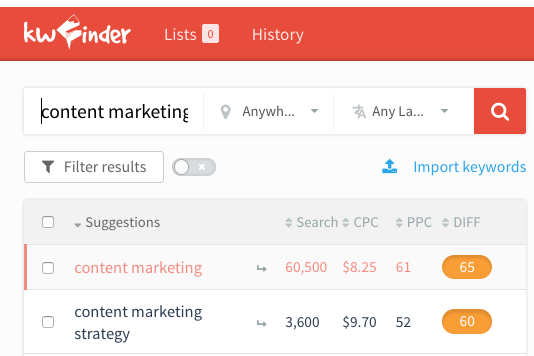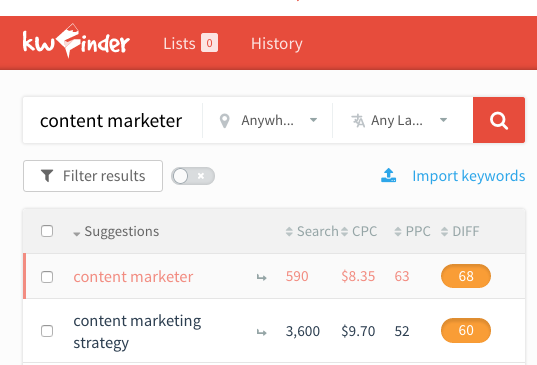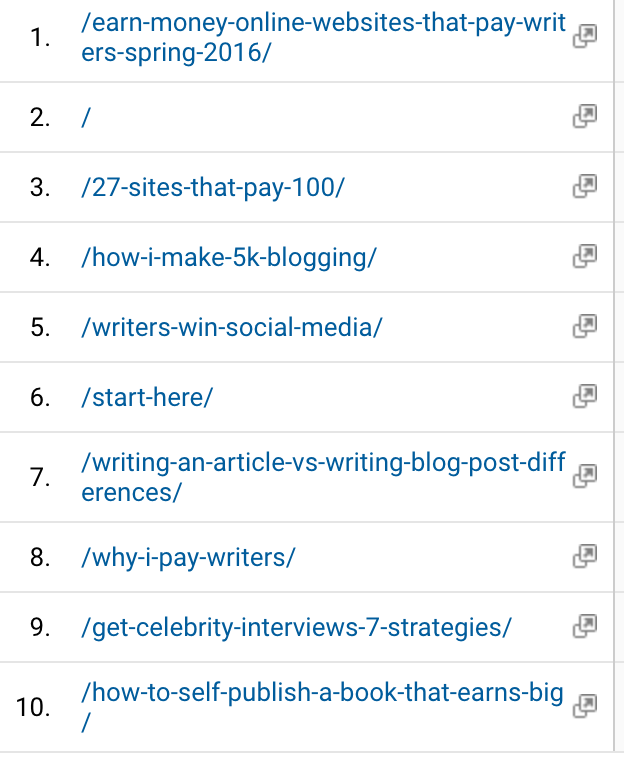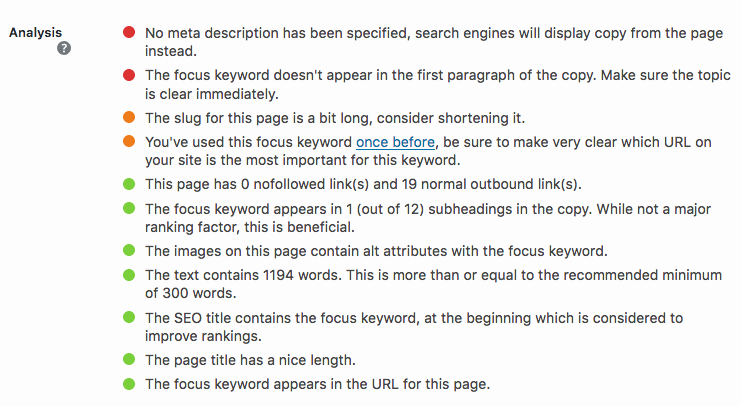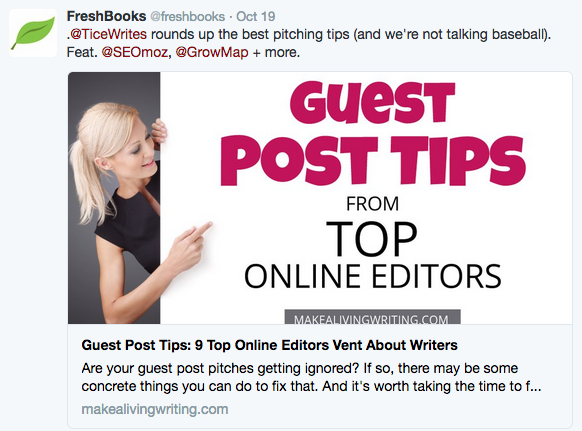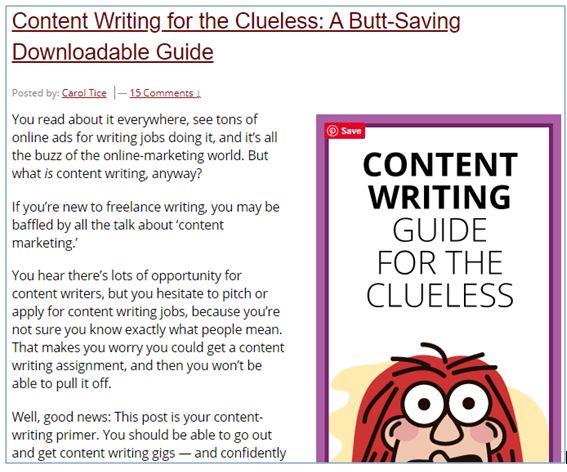
But often, when I look at their blog, I can tell right away that they’re not.
There’s a reason bloggers get asked to write posts for $20, while content marketing agencies pull down contracts worth tens of thousands of dollars.
It’s because there’s a lot more that goes into effective content marketing than simply writing a blog post.
Wondering what makes the difference?
It’s worth finding out, because of the huge income increase writers can see promoting themselves as a content marketing strategist, rather than simply a blogger.
Here are 10 things content marketers do that most bloggers don’t bother with (full disclosure: some links below are affiliates):
1. Keyword research
Do you toss off blog posts about whatever strikes your fancy?
Content marketers don’t do that. They begin their writing process with keyword research on their topic, to find out what phrases are both popular and relatively easy to rank for.
Then, they build them into fascinating headlines their readers will be unable to resist.
For instance, in looking at what headline to use for this post:
- I learned that ‘content marketing’ was a way better key phrase to go for than ‘content marketer.’
- Weirdly, hardly anyone searches on that second one, yet it’s actually a harder phrase to rank for, my Kwfinder search indicates. Go figure:
2. Read competitors
Do you know what the top blogs in your space published this week?
Content marketing depends on having this intel, so you can position your blog (or case study, or white paper, or infographic) to mine similar territory in new — ideally, even more useful — ways.
3. Study analytics
Once a blog has even a half-dozen posts, you can begin developing stronger posts by studying what’s done better in the past. Content marketers are obsessed with this sort of data, while many bloggers have never once looked at their trends.
For instance, here are the top-performing posts in a recent month for my blog; this shows me which topics and keywords I should use again in new posts:
4. Build relationships
Content marketing relies on relationships with other influential bloggers. Smart content marketers get out and start building connections, long before they need to ask for an interview or a retweet from a top influencer.
By contrast, amateur bloggers reach out with emails that essentially say, “Hey total stranger, would you do me a favor?” And then wonder why they don’t get any shares.
5. Tweak post SEO
If you don’t have a tool like Yoast SEO that helps you improve the SEO of your post, you’re pretty much wasting your time writing the post.
Think about how many posts come out each day that you’re competing with! You’ve got to help Google realize what yours is about, or you’re never going to get the readers you want.
Here at Make a Living Writing, checking our SEO analysis and tweaking to improve it is something we invest serious time in. Yoast gives us messages like this, that we can then take action on to improve the SEO of our post (without being keyword-stuffing and spammy):
6. See the post as a starting point
Most bloggers write a post, press ‘publish,’ and figure their job is done. Maybe they tweet it out once.
For content marketers, creating the post is just the beginning. It’s the ‘content’ half of content marketing. Next, the marketing half begins…and goes on. And on.
For instance, I’ve noticed that the content-marketing team at Entrepreneur.com continues to promote a popular “50 business blog-ideas” post I wrote in 2012. They even share it from their Spanish edition, @SoyEntrepreneur:
That’s a company re-sharing its own content over and over. Anybody can understand why that would make sense. But more sophisticated content marketers take it a step further.
I’ve been watching top social-media influencer Sam Hurley‘s approach. If he finds a post of mine that he likes, he retweets it dozens of times. He’ll retweet it every day for weeks on end, as he did with this post (note the nice number of retweets he gets, with his big social-media audience):
Content marketers fire up their scheduling tools (I like HootSuite and Missinglettr), plug good content in, and schedule it out for weeks at a time. This means that when they have stuff of their own they want to promote, they have a deck of other good stuff to sprinkle it into, so they don’t seem too salesy and self-promotional.
Also, repeatedly sharing others’ content is a terrific relationship-builder. I now happily follow and share Sam’s content, right back at him.
7. Create posts with built-in virality
Ever sit down before you write a post and think about how easy or hard your topic would be to promote?
Content marketers do. They engineer their posts so it’ll be fairly easy to get tons of shares.
Tried-and-true ways to do that include things like:
- Mentioning big brands or
- Quoting top influencers who you hope will share the post with their larger audiences.
I did a double-hit on this post, which mentioned editors with decent-sized audiences of their own from big online sites with huge follower numbers. No surprise, it ended up the most popular post of the month:
8. Have editorial and marketing calendars
Do you know what you’ll be publishing on your blog a month from now?
Content marketing strategists do. They know what they’ll be selling months from now, and are busy devising complementary content that will drive the right sort of readers.
Note: This is a time-honored strategy that began with complementary copy in magazines, where an article about how to put on makeup is always sitting right next to that Maybelline ad.
I’ll just say the last time I was out guest posting to promote a new e-book, some of the top blogs I contacted let me know they were booked out about three months. Content marketers plan ahead!
For instance, here’s a post I did the week we were selling the Make Money Blogging for Clients Bootcamp in the Freelance Writers Den. Obviously, it was designed to attract readers who might be interested in blogging and content marketing:
9. Write posts with a CTA
Do readers know what to do at the end of reading your blog post?
Content marketing involves creating content that’s released in service of getting readers to take a particular action. That call to action (CTA) moves readers along the road to being buyers.
Content marketers close the loop by letting you know what they’d like you to do next, even if it’s just subscribing to their blog.
Here’s the engagement question and ad that sat at the bottom of that post above about blogging and content marketing:
- Are you a blogger or content writer? Share your experience in the comments.
One final note on this — the days when “sign up for posts!” worked as a CTA are long gone. Create a useful freebie if you hope to build a list.
10. Build a social-media audience
I wish I had a dime for every blogger I’ve met who says they hate Twitter, or plan to get into using social media some day, but just never seem to have time. Why?
Social media is one of the primary content-marketing tools.”
I’d say these days, I’m recruited to write in part because I have a decent-sized Twitter following. Being a content marketer means showing you can offer more than just good writing — you’re a total package of good writing and promotional savvy.
Tip: Stop thinking it’s too late, or too hard to get many followers, and get started in social media.
- Connect with popular bloggers who already have a big social-media audience, and you may be able to build up pretty quickly.
Every day you wait is a day longer it’ll be until you have enough followers to move the needle on clicks.
Develop your content marketing skills to earn more
Ready to start earning more as a freelance writer? Start developing your content marketing skills. Knowing how to write a blog post is a useful skill. Knowing how to promote that blog post, drive traffic, and help your clients is eve better. Keep going.
Questions about content marketing vs. blogging? Let’s discuss in the comments below.







